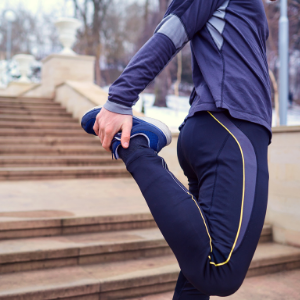The Role of Sport-Life Balance and Well-Being on Athletic Performance
DOI:
https://doi.org/10.53379/cjcd.2022.330Keywords:
Sport, well-being, athletic transitions, career transition, sport-life balance, support, performanceAbstract
The present study explores the role of sport-life balance and well-being on athletic performance. Canadian athletes who competed at the 2019 Pan American and Para Pan American Games in Lima, Peru were invited to participate in the survey via email. A mixed-methods design was utilized, consisting of an online survey and semi-structured, follow-up interviews. The sample consisted of 72 athletes, spanning eighteen different sports. Our findings demonstrate that while many Olympic and Paralympic athletes are successful in maintaining a strong support network, significant concerns arose regarding meagre finances, a lack of free time, and minimal support both within and outside of sport. Perspectives on the benefits of sport-life balance on performance were mixed, with the majority of athletes revealing that they were unsure of the benefits, did not experience benefits, or experienced negative effects. Feelings of dissatisfaction with performance, experiences of being overwhelmed in managing an athletic career, and tensions in developing a self outside of sport were prevalent among the athletes.
References
Aquilina, D. (2013): A Study of the Relationship Between Elite Athletes’ Educational Development and Sporting Performance, The International Journal of the History of Sport, 30(4), 374-392
Dehghansai, N., Pinder, R. A., Baker, J., & Renshaw, I. (2021). Challenges and stresses experienced by athletes and coaches leading up to the Paralympic Games. Plos one, 16(5), e0251171.
Friesen, A., & Orlick, T. (2010). A qualitative analysis of holistic sport psychology consultants’ professional philosophies. Sport Psychologist, 24(2), 227-244. Retrieved from http://journals.humankinetics.com/tsp
Game Plan. (2018). Retrieved March 22, 2019, from https://www.mygameplan.ca/
Gordon, S., & Lavallee, D. (2012). Career transitions. In T. Morris & P. Terry (Eds.), The new sport and exercise psychology companion (pp. 567-582). Morgantown, WV: Fitness Information Technology.
Hall, T. (2019, November 18). When the Games Are Over. Retrieved August 19, 2020, from https://thewalrus.ca/when-the-games-are-over/
Hansen, A., Perry, J., Ross, M., & Montgomery, T. (2018). Facilitating a successful transition out of sport: Introduction of a collegiate student-athlete workshop. Journal of Sport Psychology in Action, 10(1), 1-9.
Henriksen, K., Schinke, R., McCann, S., Durand-Bush, N., Moesch, K., Parham, W. D., Larsen, C., Cogan, K., Donaldson, A., Poczwardowski, A., Noce, F., & Hunziker, J. (2020). Athlete mental health in the Olympic/Paralympic quadrennium: a multi-societal consensus statement. International Journal of Sport and Exercise Psychology, 18(3), 391-408.
Kelly, J. (2021). Tennis Star Naomi Osaka Stood Up For Herself, Bravely Shared Her Mental Health Issues And Walked Away From The French Open. Forbes. Retrieved from https://www.forbes.com/sites/jackkelly/2021/06/01/tennis-star-naomi-osaka-stood-up-for-herself-bravely--shared-her-mental-health-issues-and-walked-away-from-the-french-open/?sh=30a552f21e37.
Knapp, D. (2012). Performance of student-athletes at Olympic Games: The performance impact of university student-athletes at the 2004, 2008, and 2012 Olympic Games. Adcell Group, 1-36. Retrieved from http://adcellgroup.com.au/development/uniroos/images/Performance_of_student-athletes_at_Olympic_Games.pdf
Knights, S., Sherry, E., & Ruddock-Hudson, M. (2016). Investigating elite end-of-athletic-career transition: A systematic review. Journal of Applied Sport Psychology, 28(3), 291-308.
McArdle, S., Moore, P., & Lyons, D. (2014). Olympic athletes’ experiences of a post games career transition program. The Sport Psychologist, 28(3), 269-278.
Miles, F. (2020, August 06). Michael Phelps, other athletes, open up about suicide and depression in new documentary. Retrieved August 17, 2020, from https://www.foxnews.com/sports/michael-phelps-suicide-depression-athletes-documentary
Ohashi, Alison, “Transitioning Out of Sport: Perspectives of Student-Athlete Support or Development Services” (2018). Boise State University Theses and Dissertations. 1406. https://scholarworks.boisestate.edu/td/1406/
Park, S., Lavallee, D., & Tod, D. (2013). Athletes’ career transition out of sport: A systematic review. International review of sport and exercise psychology, 6(1), 22-53.
Pink, M., Saunders, J., & Stynes, J. (2015). Reconciling the maintenance of on-field success with off-field player development: A case study of club culture within the Australian Football League. Psychology of Sport and Exercise, 21(1), 98-108.
Vallerand, R. J., & Verner‐Filion, J. (2020). Theory and research in passion for sport and exercise. Handbook of sport psychology, 206-229.
Wylleman, P., & Lavallee, D. (2004). A developmental perspective on transitions faced by athletes. In M. Weiss (Ed.), Developmental sport and exercise psychology: A lifespan perspective (pp. 507-527). Morgantown, WV: Fitness Information Technology.

Published
How to Cite
Issue
Section
License
Copyright (c) 2022 Canadian Journal of Career Development

This work is licensed under a Creative Commons Attribution-NonCommercial-NoDerivatives 4.0 International License.














